Orientation for Success in Higher Education: A Reflective Report
VerifiedAdded on 2023/06/10
|7
|1984
|288
Report
AI Summary
This report delves into the concept of reflective learning and its significance in higher education, focusing on the Gibbs model as a framework for understanding the process. It begins by defining reflection and the reflective approach, emphasizing the importance of recalling past experiences to identify and learn key concepts. The report then describes the Gibbs model, outlining its stages: description, feelings, evaluation, analysis, conclusion, and action plan. Furthermore, the report explores the nature of feedback and feedforward within the Gibbs model, highlighting their roles in providing insights, boosting morale, and guiding future actions. It also examines how the reflective approach improves formative and summative assessments by developing critical thinking skills and enhancing self-assessment. The report concludes by summarizing the benefits of reflection and the Gibbs model in fostering student development and academic success, emphasizing the importance of assessments in personal and professional growth.
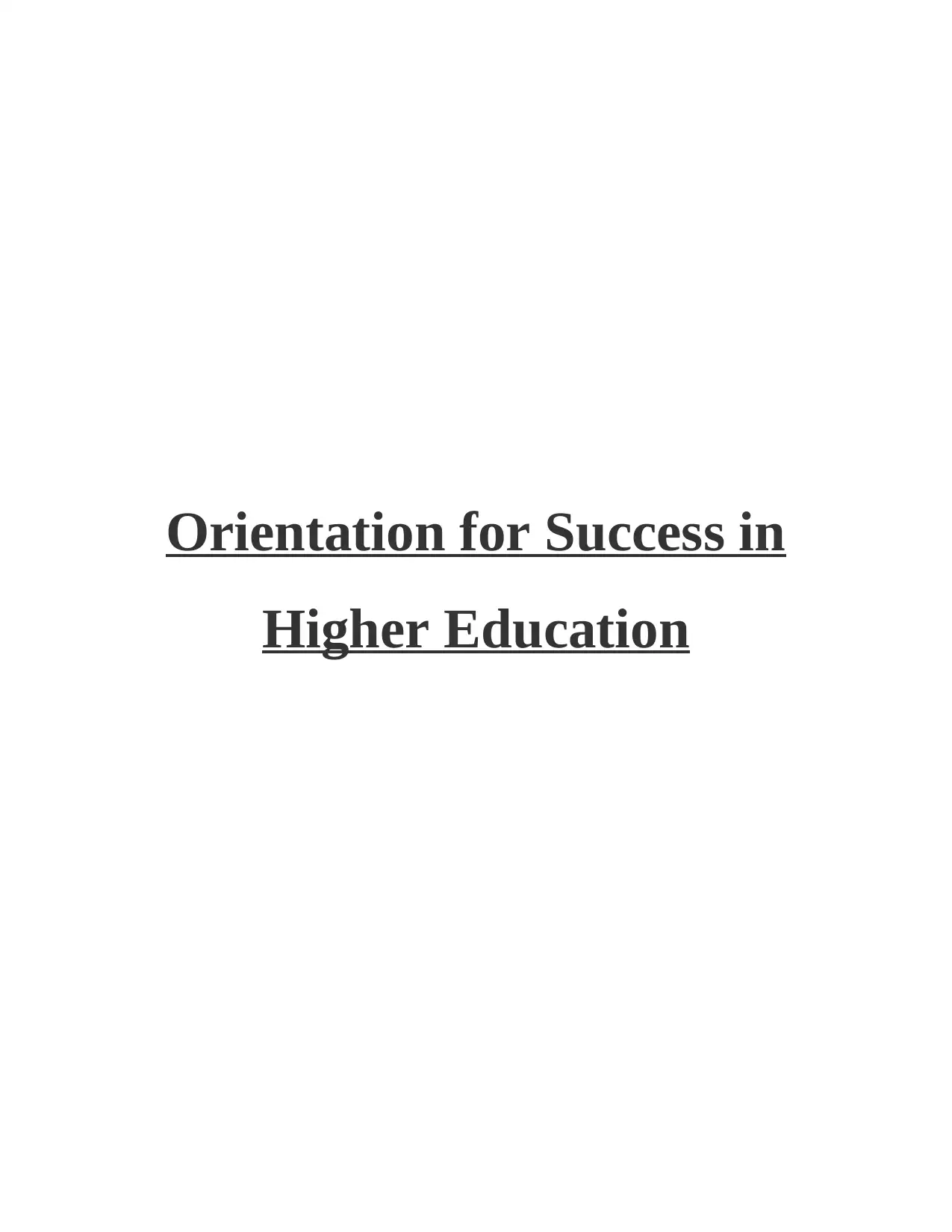
Orientation for Success in
Higher Education
Higher Education
Paraphrase This Document
Need a fresh take? Get an instant paraphrase of this document with our AI Paraphraser
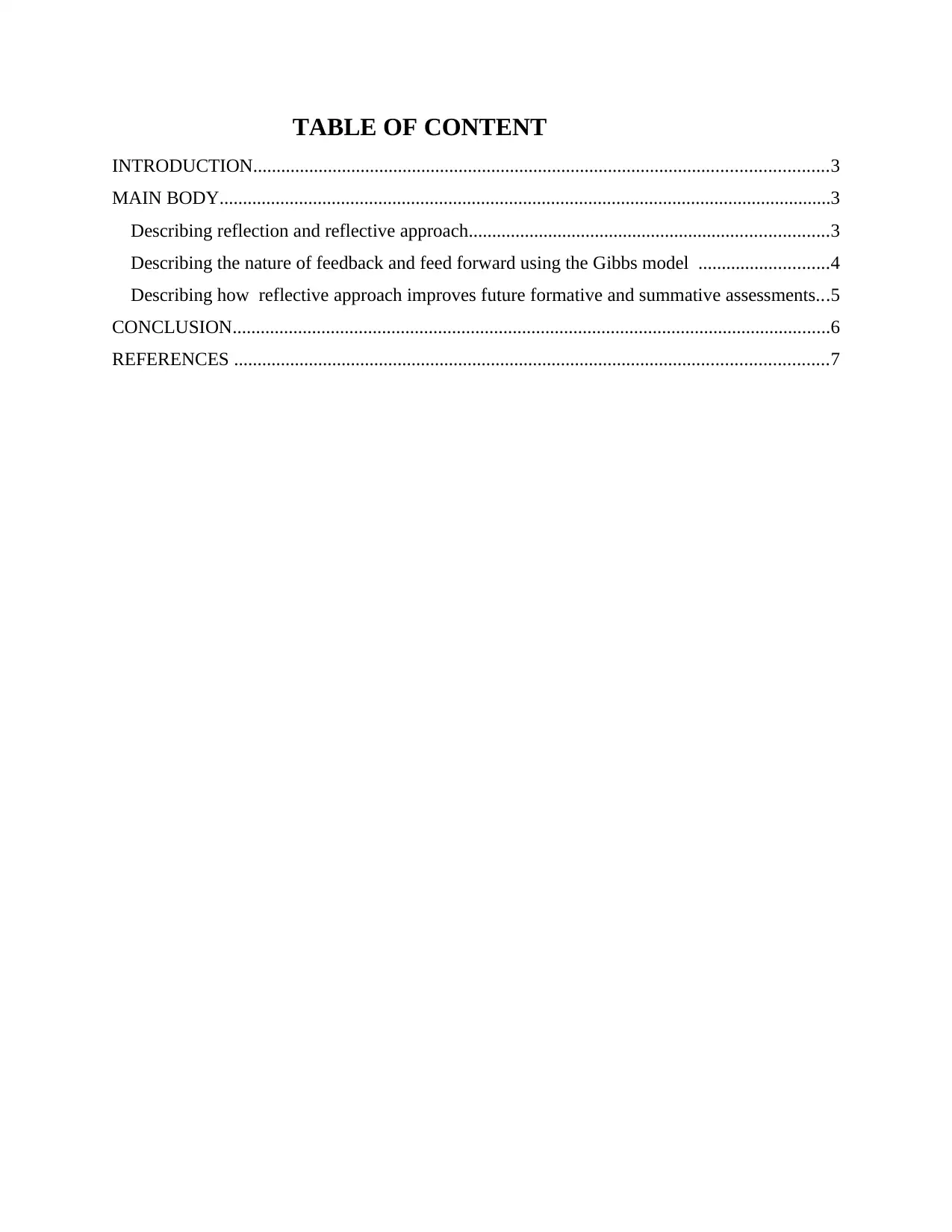
TABLE OF CONTENT
INTRODUCTION...........................................................................................................................3
MAIN BODY...................................................................................................................................3
Describing reflection and reflective approach.............................................................................3
Describing the nature of feedback and feed forward using the Gibbs model ............................4
Describing how reflective approach improves future formative and summative assessments...5
CONCLUSION................................................................................................................................6
REFERENCES ...............................................................................................................................7
INTRODUCTION...........................................................................................................................3
MAIN BODY...................................................................................................................................3
Describing reflection and reflective approach.............................................................................3
Describing the nature of feedback and feed forward using the Gibbs model ............................4
Describing how reflective approach improves future formative and summative assessments...5
CONCLUSION................................................................................................................................6
REFERENCES ...............................................................................................................................7
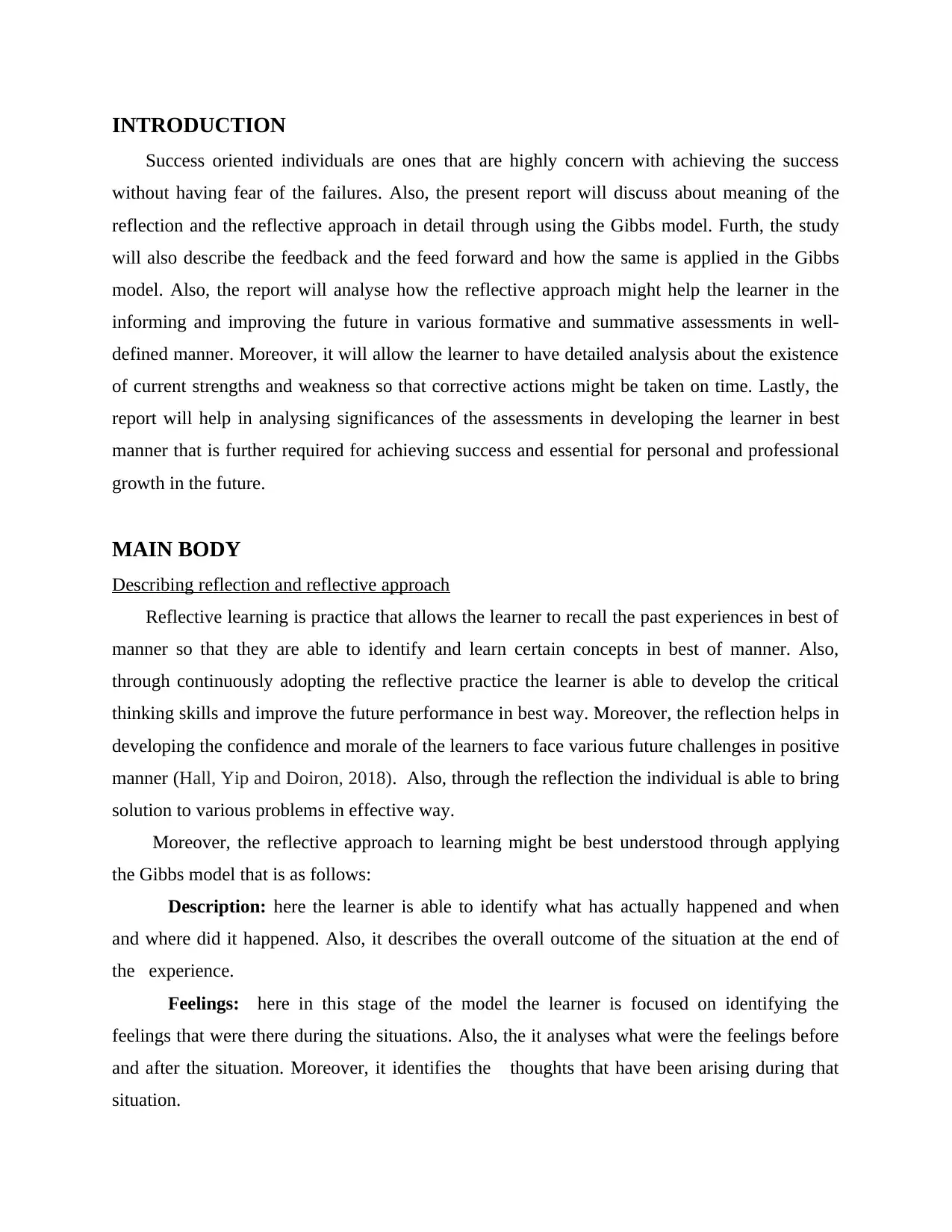
INTRODUCTION
Success oriented individuals are ones that are highly concern with achieving the success
without having fear of the failures. Also, the present report will discuss about meaning of the
reflection and the reflective approach in detail through using the Gibbs model. Furth, the study
will also describe the feedback and the feed forward and how the same is applied in the Gibbs
model. Also, the report will analyse how the reflective approach might help the learner in the
informing and improving the future in various formative and summative assessments in well-
defined manner. Moreover, it will allow the learner to have detailed analysis about the existence
of current strengths and weakness so that corrective actions might be taken on time. Lastly, the
report will help in analysing significances of the assessments in developing the learner in best
manner that is further required for achieving success and essential for personal and professional
growth in the future.
MAIN BODY
Describing reflection and reflective approach
Reflective learning is practice that allows the learner to recall the past experiences in best of
manner so that they are able to identify and learn certain concepts in best of manner. Also,
through continuously adopting the reflective practice the learner is able to develop the critical
thinking skills and improve the future performance in best way. Moreover, the reflection helps in
developing the confidence and morale of the learners to face various future challenges in positive
manner (Hall, Yip and Doiron, 2018). Also, through the reflection the individual is able to bring
solution to various problems in effective way.
Moreover, the reflective approach to learning might be best understood through applying
the Gibbs model that is as follows:
Description: here the learner is able to identify what has actually happened and when
and where did it happened. Also, it describes the overall outcome of the situation at the end of
the experience.
Feelings: here in this stage of the model the learner is focused on identifying the
feelings that were there during the situations. Also, the it analyses what were the feelings before
and after the situation. Moreover, it identifies the thoughts that have been arising during that
situation.
Success oriented individuals are ones that are highly concern with achieving the success
without having fear of the failures. Also, the present report will discuss about meaning of the
reflection and the reflective approach in detail through using the Gibbs model. Furth, the study
will also describe the feedback and the feed forward and how the same is applied in the Gibbs
model. Also, the report will analyse how the reflective approach might help the learner in the
informing and improving the future in various formative and summative assessments in well-
defined manner. Moreover, it will allow the learner to have detailed analysis about the existence
of current strengths and weakness so that corrective actions might be taken on time. Lastly, the
report will help in analysing significances of the assessments in developing the learner in best
manner that is further required for achieving success and essential for personal and professional
growth in the future.
MAIN BODY
Describing reflection and reflective approach
Reflective learning is practice that allows the learner to recall the past experiences in best of
manner so that they are able to identify and learn certain concepts in best of manner. Also,
through continuously adopting the reflective practice the learner is able to develop the critical
thinking skills and improve the future performance in best way. Moreover, the reflection helps in
developing the confidence and morale of the learners to face various future challenges in positive
manner (Hall, Yip and Doiron, 2018). Also, through the reflection the individual is able to bring
solution to various problems in effective way.
Moreover, the reflective approach to learning might be best understood through applying
the Gibbs model that is as follows:
Description: here the learner is able to identify what has actually happened and when
and where did it happened. Also, it describes the overall outcome of the situation at the end of
the experience.
Feelings: here in this stage of the model the learner is focused on identifying the
feelings that were there during the situations. Also, the it analyses what were the feelings before
and after the situation. Moreover, it identifies the thoughts that have been arising during that
situation.
⊘ This is a preview!⊘
Do you want full access?
Subscribe today to unlock all pages.

Trusted by 1+ million students worldwide
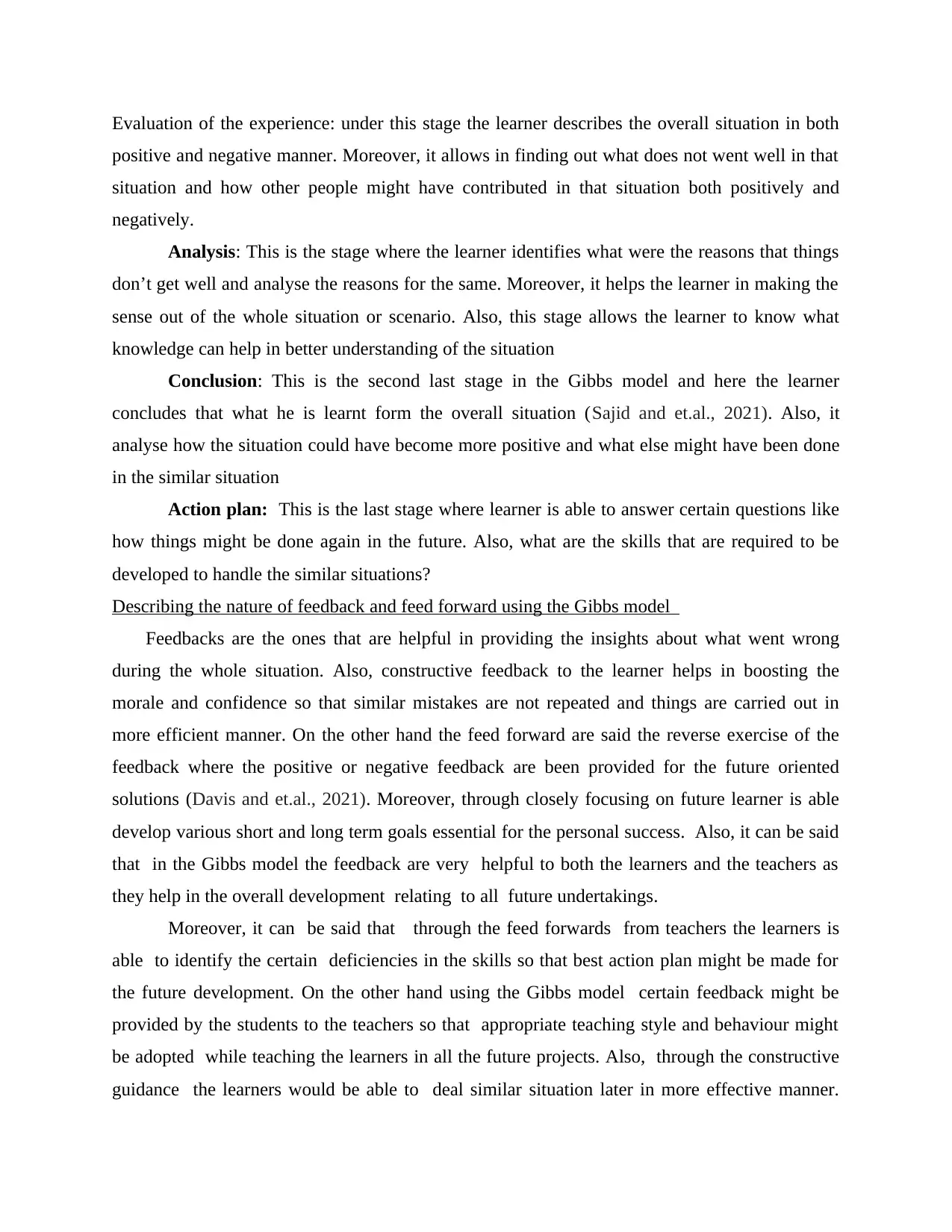
Evaluation of the experience: under this stage the learner describes the overall situation in both
positive and negative manner. Moreover, it allows in finding out what does not went well in that
situation and how other people might have contributed in that situation both positively and
negatively.
Analysis: This is the stage where the learner identifies what were the reasons that things
don’t get well and analyse the reasons for the same. Moreover, it helps the learner in making the
sense out of the whole situation or scenario. Also, this stage allows the learner to know what
knowledge can help in better understanding of the situation
Conclusion: This is the second last stage in the Gibbs model and here the learner
concludes that what he is learnt form the overall situation (Sajid and et.al., 2021). Also, it
analyse how the situation could have become more positive and what else might have been done
in the similar situation
Action plan: This is the last stage where learner is able to answer certain questions like
how things might be done again in the future. Also, what are the skills that are required to be
developed to handle the similar situations?
Describing the nature of feedback and feed forward using the Gibbs model
Feedbacks are the ones that are helpful in providing the insights about what went wrong
during the whole situation. Also, constructive feedback to the learner helps in boosting the
morale and confidence so that similar mistakes are not repeated and things are carried out in
more efficient manner. On the other hand the feed forward are said the reverse exercise of the
feedback where the positive or negative feedback are been provided for the future oriented
solutions (Davis and et.al., 2021). Moreover, through closely focusing on future learner is able
develop various short and long term goals essential for the personal success. Also, it can be said
that in the Gibbs model the feedback are very helpful to both the learners and the teachers as
they help in the overall development relating to all future undertakings.
Moreover, it can be said that through the feed forwards from teachers the learners is
able to identify the certain deficiencies in the skills so that best action plan might be made for
the future development. On the other hand using the Gibbs model certain feedback might be
provided by the students to the teachers so that appropriate teaching style and behaviour might
be adopted while teaching the learners in all the future projects. Also, through the constructive
guidance the learners would be able to deal similar situation later in more effective manner.
positive and negative manner. Moreover, it allows in finding out what does not went well in that
situation and how other people might have contributed in that situation both positively and
negatively.
Analysis: This is the stage where the learner identifies what were the reasons that things
don’t get well and analyse the reasons for the same. Moreover, it helps the learner in making the
sense out of the whole situation or scenario. Also, this stage allows the learner to know what
knowledge can help in better understanding of the situation
Conclusion: This is the second last stage in the Gibbs model and here the learner
concludes that what he is learnt form the overall situation (Sajid and et.al., 2021). Also, it
analyse how the situation could have become more positive and what else might have been done
in the similar situation
Action plan: This is the last stage where learner is able to answer certain questions like
how things might be done again in the future. Also, what are the skills that are required to be
developed to handle the similar situations?
Describing the nature of feedback and feed forward using the Gibbs model
Feedbacks are the ones that are helpful in providing the insights about what went wrong
during the whole situation. Also, constructive feedback to the learner helps in boosting the
morale and confidence so that similar mistakes are not repeated and things are carried out in
more efficient manner. On the other hand the feed forward are said the reverse exercise of the
feedback where the positive or negative feedback are been provided for the future oriented
solutions (Davis and et.al., 2021). Moreover, through closely focusing on future learner is able
develop various short and long term goals essential for the personal success. Also, it can be said
that in the Gibbs model the feedback are very helpful to both the learners and the teachers as
they help in the overall development relating to all future undertakings.
Moreover, it can be said that through the feed forwards from teachers the learners is
able to identify the certain deficiencies in the skills so that best action plan might be made for
the future development. On the other hand using the Gibbs model certain feedback might be
provided by the students to the teachers so that appropriate teaching style and behaviour might
be adopted while teaching the learners in all the future projects. Also, through the constructive
guidance the learners would be able to deal similar situation later in more effective manner.
Paraphrase This Document
Need a fresh take? Get an instant paraphrase of this document with our AI Paraphraser
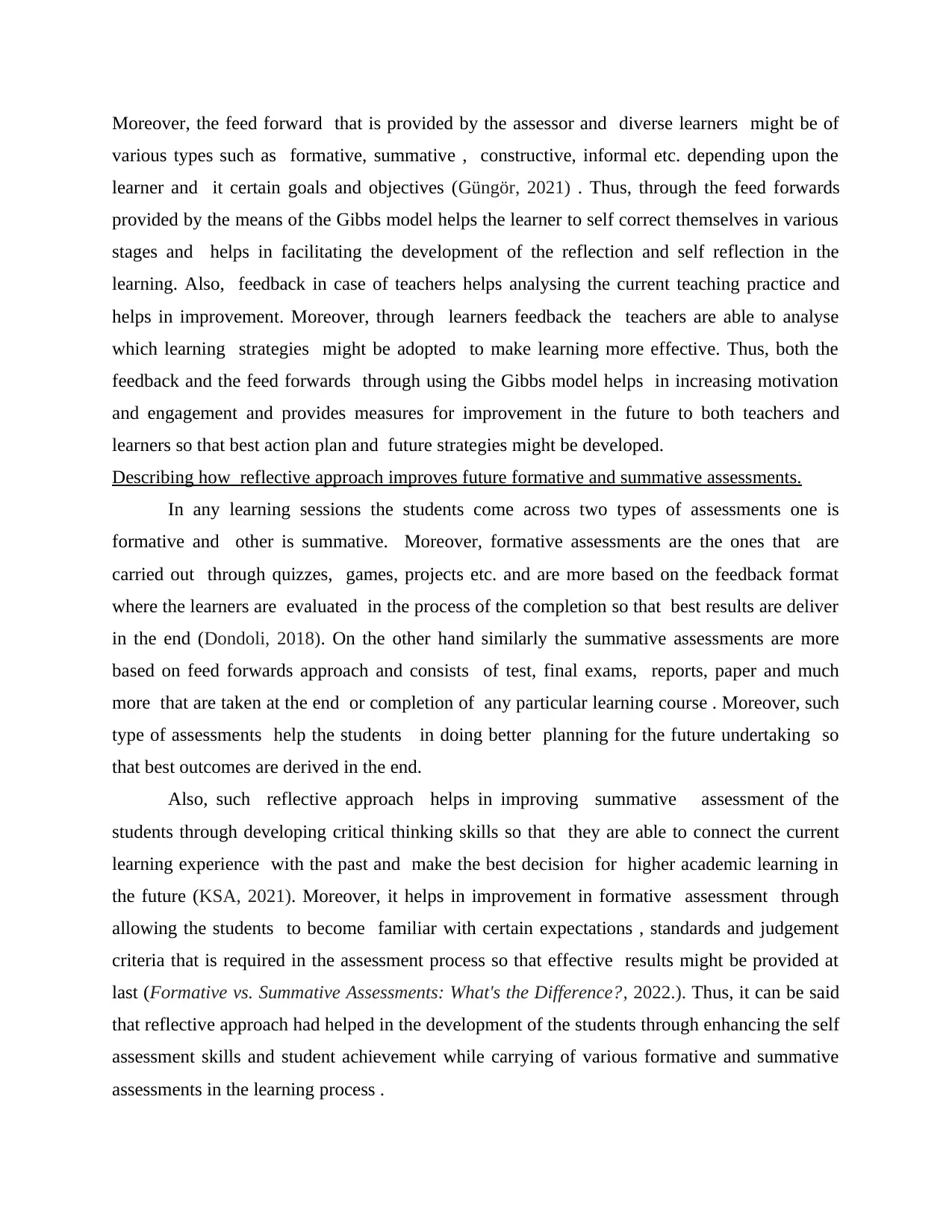
Moreover, the feed forward that is provided by the assessor and diverse learners might be of
various types such as formative, summative , constructive, informal etc. depending upon the
learner and it certain goals and objectives (Güngör, 2021) . Thus, through the feed forwards
provided by the means of the Gibbs model helps the learner to self correct themselves in various
stages and helps in facilitating the development of the reflection and self reflection in the
learning. Also, feedback in case of teachers helps analysing the current teaching practice and
helps in improvement. Moreover, through learners feedback the teachers are able to analyse
which learning strategies might be adopted to make learning more effective. Thus, both the
feedback and the feed forwards through using the Gibbs model helps in increasing motivation
and engagement and provides measures for improvement in the future to both teachers and
learners so that best action plan and future strategies might be developed.
Describing how reflective approach improves future formative and summative assessments.
In any learning sessions the students come across two types of assessments one is
formative and other is summative. Moreover, formative assessments are the ones that are
carried out through quizzes, games, projects etc. and are more based on the feedback format
where the learners are evaluated in the process of the completion so that best results are deliver
in the end (Dondoli, 2018). On the other hand similarly the summative assessments are more
based on feed forwards approach and consists of test, final exams, reports, paper and much
more that are taken at the end or completion of any particular learning course . Moreover, such
type of assessments help the students in doing better planning for the future undertaking so
that best outcomes are derived in the end.
Also, such reflective approach helps in improving summative assessment of the
students through developing critical thinking skills so that they are able to connect the current
learning experience with the past and make the best decision for higher academic learning in
the future (KSA, 2021). Moreover, it helps in improvement in formative assessment through
allowing the students to become familiar with certain expectations , standards and judgement
criteria that is required in the assessment process so that effective results might be provided at
last (Formative vs. Summative Assessments: What's the Difference?, 2022.). Thus, it can be said
that reflective approach had helped in the development of the students through enhancing the self
assessment skills and student achievement while carrying of various formative and summative
assessments in the learning process .
various types such as formative, summative , constructive, informal etc. depending upon the
learner and it certain goals and objectives (Güngör, 2021) . Thus, through the feed forwards
provided by the means of the Gibbs model helps the learner to self correct themselves in various
stages and helps in facilitating the development of the reflection and self reflection in the
learning. Also, feedback in case of teachers helps analysing the current teaching practice and
helps in improvement. Moreover, through learners feedback the teachers are able to analyse
which learning strategies might be adopted to make learning more effective. Thus, both the
feedback and the feed forwards through using the Gibbs model helps in increasing motivation
and engagement and provides measures for improvement in the future to both teachers and
learners so that best action plan and future strategies might be developed.
Describing how reflective approach improves future formative and summative assessments.
In any learning sessions the students come across two types of assessments one is
formative and other is summative. Moreover, formative assessments are the ones that are
carried out through quizzes, games, projects etc. and are more based on the feedback format
where the learners are evaluated in the process of the completion so that best results are deliver
in the end (Dondoli, 2018). On the other hand similarly the summative assessments are more
based on feed forwards approach and consists of test, final exams, reports, paper and much
more that are taken at the end or completion of any particular learning course . Moreover, such
type of assessments help the students in doing better planning for the future undertaking so
that best outcomes are derived in the end.
Also, such reflective approach helps in improving summative assessment of the
students through developing critical thinking skills so that they are able to connect the current
learning experience with the past and make the best decision for higher academic learning in
the future (KSA, 2021). Moreover, it helps in improvement in formative assessment through
allowing the students to become familiar with certain expectations , standards and judgement
criteria that is required in the assessment process so that effective results might be provided at
last (Formative vs. Summative Assessments: What's the Difference?, 2022.). Thus, it can be said
that reflective approach had helped in the development of the students through enhancing the self
assessment skills and student achievement while carrying of various formative and summative
assessments in the learning process .
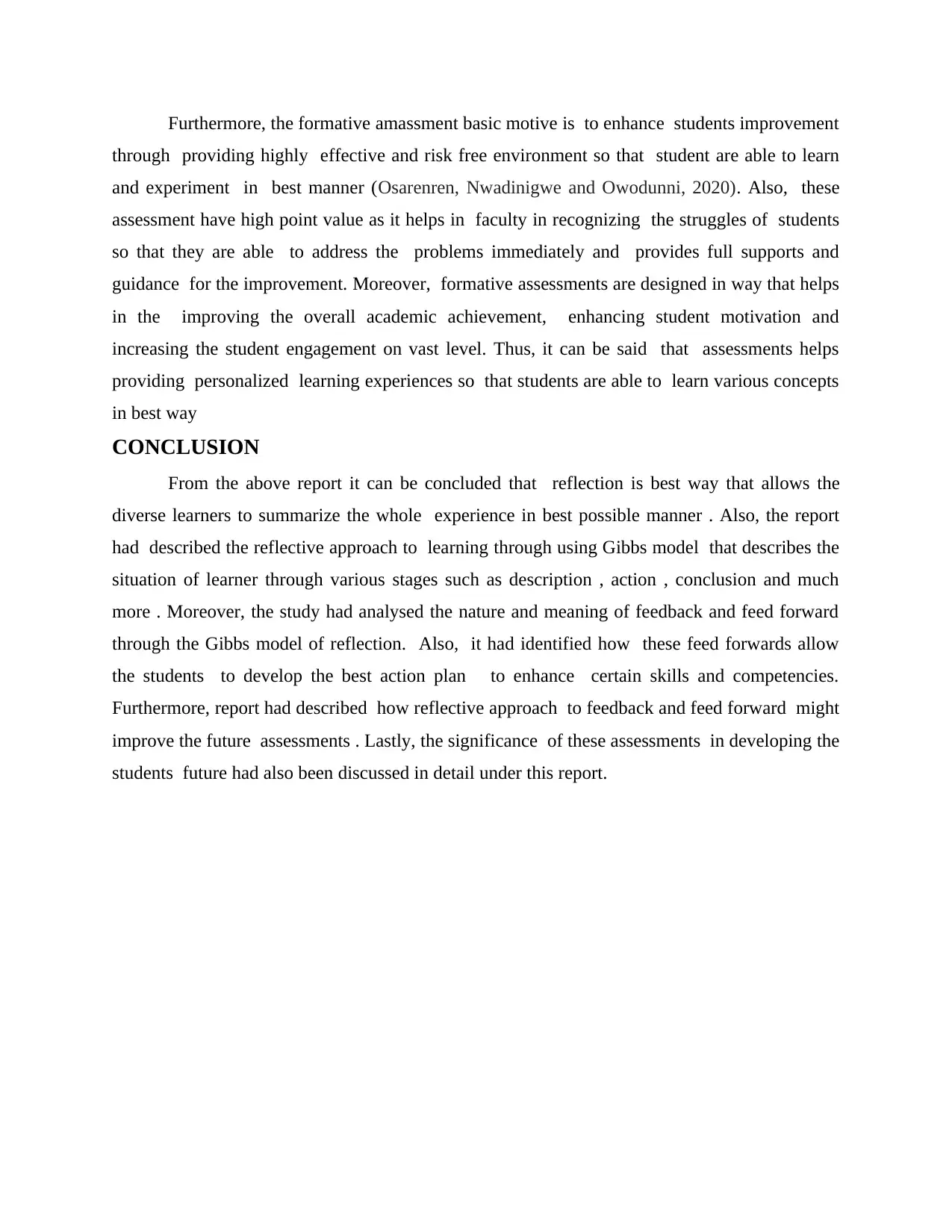
Furthermore, the formative amassment basic motive is to enhance students improvement
through providing highly effective and risk free environment so that student are able to learn
and experiment in best manner (Osarenren, Nwadinigwe and Owodunni, 2020). Also, these
assessment have high point value as it helps in faculty in recognizing the struggles of students
so that they are able to address the problems immediately and provides full supports and
guidance for the improvement. Moreover, formative assessments are designed in way that helps
in the improving the overall academic achievement, enhancing student motivation and
increasing the student engagement on vast level. Thus, it can be said that assessments helps
providing personalized learning experiences so that students are able to learn various concepts
in best way
CONCLUSION
From the above report it can be concluded that reflection is best way that allows the
diverse learners to summarize the whole experience in best possible manner . Also, the report
had described the reflective approach to learning through using Gibbs model that describes the
situation of learner through various stages such as description , action , conclusion and much
more . Moreover, the study had analysed the nature and meaning of feedback and feed forward
through the Gibbs model of reflection. Also, it had identified how these feed forwards allow
the students to develop the best action plan to enhance certain skills and competencies.
Furthermore, report had described how reflective approach to feedback and feed forward might
improve the future assessments . Lastly, the significance of these assessments in developing the
students future had also been discussed in detail under this report.
through providing highly effective and risk free environment so that student are able to learn
and experiment in best manner (Osarenren, Nwadinigwe and Owodunni, 2020). Also, these
assessment have high point value as it helps in faculty in recognizing the struggles of students
so that they are able to address the problems immediately and provides full supports and
guidance for the improvement. Moreover, formative assessments are designed in way that helps
in the improving the overall academic achievement, enhancing student motivation and
increasing the student engagement on vast level. Thus, it can be said that assessments helps
providing personalized learning experiences so that students are able to learn various concepts
in best way
CONCLUSION
From the above report it can be concluded that reflection is best way that allows the
diverse learners to summarize the whole experience in best possible manner . Also, the report
had described the reflective approach to learning through using Gibbs model that describes the
situation of learner through various stages such as description , action , conclusion and much
more . Moreover, the study had analysed the nature and meaning of feedback and feed forward
through the Gibbs model of reflection. Also, it had identified how these feed forwards allow
the students to develop the best action plan to enhance certain skills and competencies.
Furthermore, report had described how reflective approach to feedback and feed forward might
improve the future assessments . Lastly, the significance of these assessments in developing the
students future had also been discussed in detail under this report.
⊘ This is a preview!⊘
Do you want full access?
Subscribe today to unlock all pages.

Trusted by 1+ million students worldwide
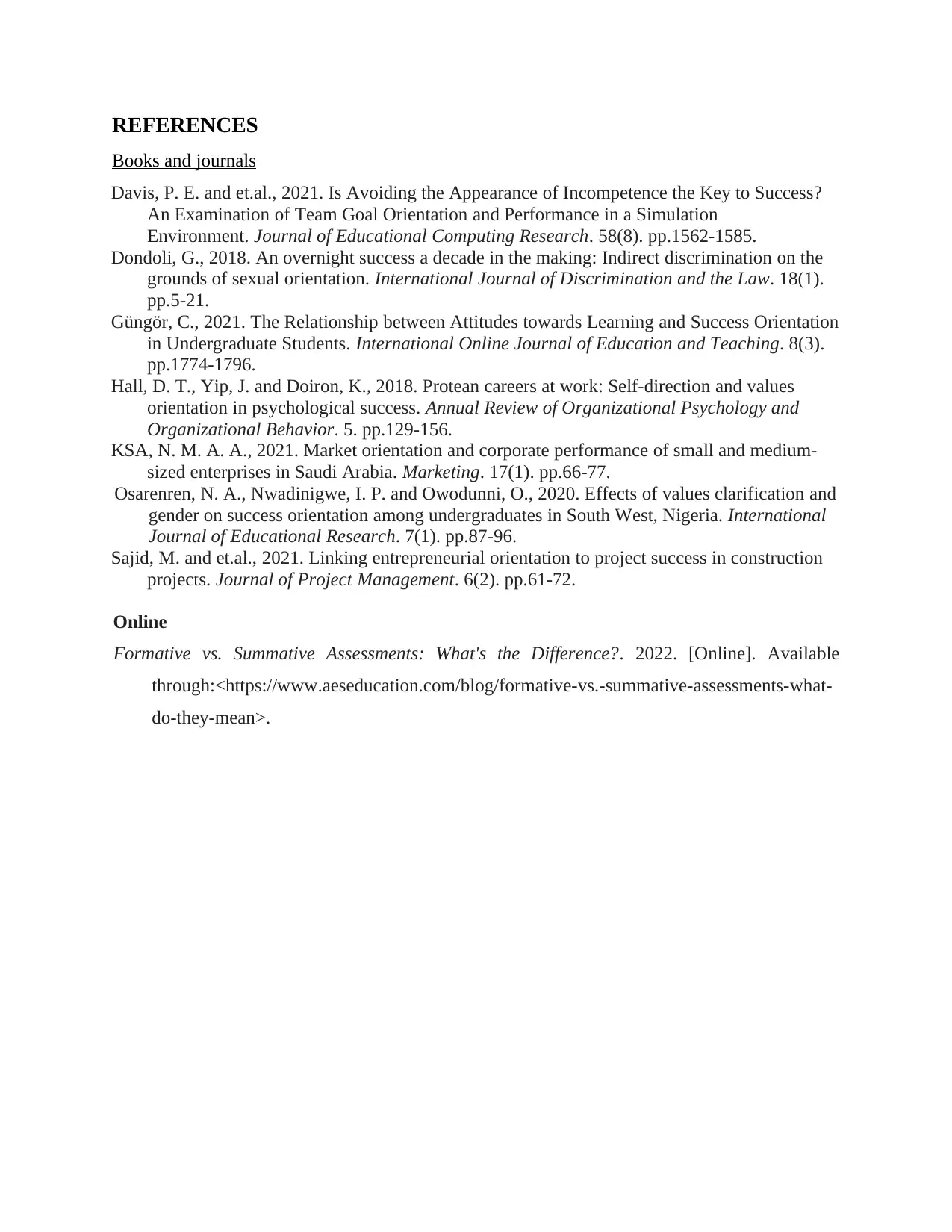
REFERENCES
Books and journals
Davis, P. E. and et.al., 2021. Is Avoiding the Appearance of Incompetence the Key to Success?
An Examination of Team Goal Orientation and Performance in a Simulation
Environment. Journal of Educational Computing Research. 58(8). pp.1562-1585.
Dondoli, G., 2018. An overnight success a decade in the making: Indirect discrimination on the
grounds of sexual orientation. International Journal of Discrimination and the Law. 18(1).
pp.5-21.
Güngör, C., 2021. The Relationship between Attitudes towards Learning and Success Orientation
in Undergraduate Students. International Online Journal of Education and Teaching. 8(3).
pp.1774-1796.
Hall, D. T., Yip, J. and Doiron, K., 2018. Protean careers at work: Self-direction and values
orientation in psychological success. Annual Review of Organizational Psychology and
Organizational Behavior. 5. pp.129-156.
KSA, N. M. A. A., 2021. Market orientation and corporate performance of small and medium-
sized enterprises in Saudi Arabia. Marketing. 17(1). pp.66-77.
Osarenren, N. A., Nwadinigwe, I. P. and Owodunni, O., 2020. Effects of values clarification and
gender on success orientation among undergraduates in South West, Nigeria. International
Journal of Educational Research. 7(1). pp.87-96.
Sajid, M. and et.al., 2021. Linking entrepreneurial orientation to project success in construction
projects. Journal of Project Management. 6(2). pp.61-72.
Online
Formative vs. Summative Assessments: What's the Difference?. 2022. [Online]. Available
through:<https://www.aeseducation.com/blog/formative-vs.-summative-assessments-what-
do-they-mean>.
Books and journals
Davis, P. E. and et.al., 2021. Is Avoiding the Appearance of Incompetence the Key to Success?
An Examination of Team Goal Orientation and Performance in a Simulation
Environment. Journal of Educational Computing Research. 58(8). pp.1562-1585.
Dondoli, G., 2018. An overnight success a decade in the making: Indirect discrimination on the
grounds of sexual orientation. International Journal of Discrimination and the Law. 18(1).
pp.5-21.
Güngör, C., 2021. The Relationship between Attitudes towards Learning and Success Orientation
in Undergraduate Students. International Online Journal of Education and Teaching. 8(3).
pp.1774-1796.
Hall, D. T., Yip, J. and Doiron, K., 2018. Protean careers at work: Self-direction and values
orientation in psychological success. Annual Review of Organizational Psychology and
Organizational Behavior. 5. pp.129-156.
KSA, N. M. A. A., 2021. Market orientation and corporate performance of small and medium-
sized enterprises in Saudi Arabia. Marketing. 17(1). pp.66-77.
Osarenren, N. A., Nwadinigwe, I. P. and Owodunni, O., 2020. Effects of values clarification and
gender on success orientation among undergraduates in South West, Nigeria. International
Journal of Educational Research. 7(1). pp.87-96.
Sajid, M. and et.al., 2021. Linking entrepreneurial orientation to project success in construction
projects. Journal of Project Management. 6(2). pp.61-72.
Online
Formative vs. Summative Assessments: What's the Difference?. 2022. [Online]. Available
through:<https://www.aeseducation.com/blog/formative-vs.-summative-assessments-what-
do-they-mean>.
1 out of 7
Related Documents
Your All-in-One AI-Powered Toolkit for Academic Success.
+13062052269
info@desklib.com
Available 24*7 on WhatsApp / Email
![[object Object]](/_next/static/media/star-bottom.7253800d.svg)
Unlock your academic potential
Copyright © 2020–2025 A2Z Services. All Rights Reserved. Developed and managed by ZUCOL.




